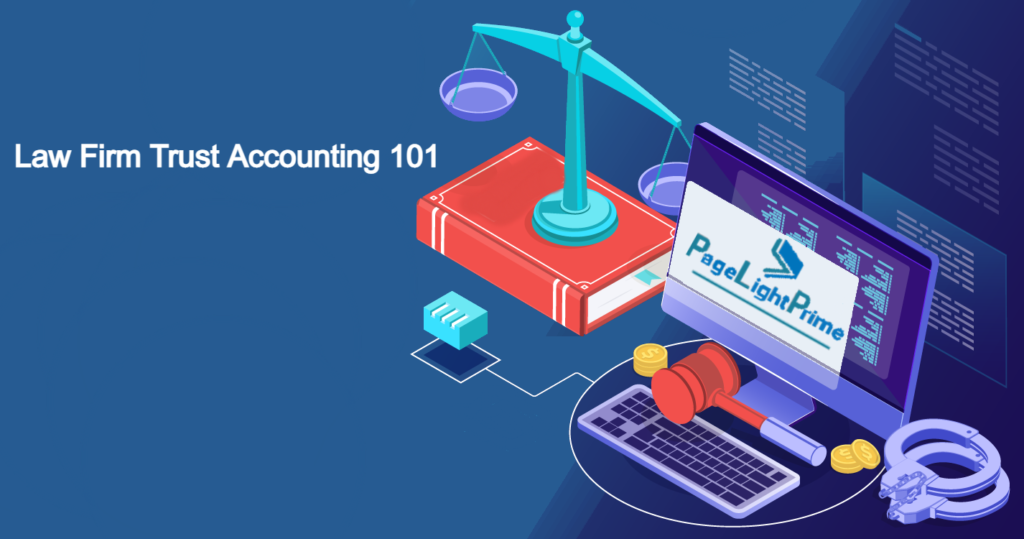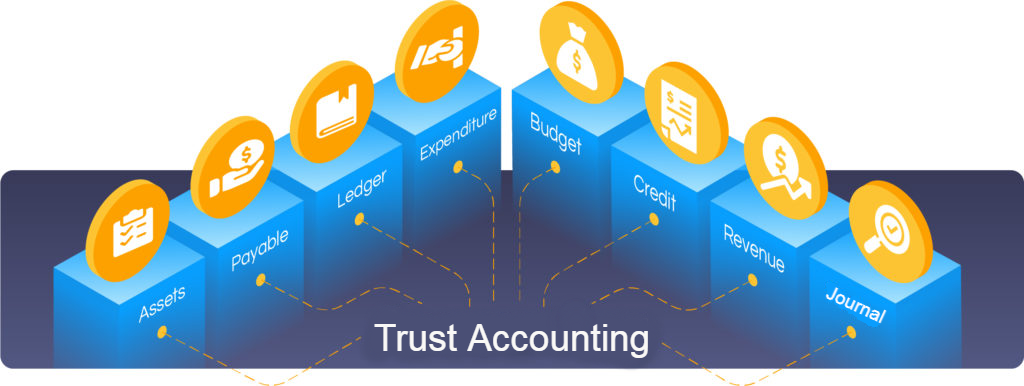Law Firm Trust Accounting 101
Attorneys are distracted from running their firm by becoming accountants to manage the trust account to law society or state bar regulations. Most feared topic for lawyers is being compliant with changing guidelines of trust account.

Written by Knowledge Team, posted on Sep 01, 2022
Concept of law firm trust accounting. Standards, requirements, and best practices around the legal trust account management. Trust accounting made simple for attorneys.
Preamble to Legal Trust Accounting
Concept of trust accounting management states to keep client money or unearned fees separately from the law firm operating account. When implemented in practice, minor mistake by untrained staff or even banks and credit card processing company can lead to escalation with audits. The self-inflicted issues can be addressed by training, change management and legal accounting software.

What is Trust Accounting
Law firms must keep track of client money and must not mix with operating or current account. Operating account is the business account and money in this account belongs to the firm. Money in trust account is earned yet. The following are major requirements for the trust account.
- Operating and Trust account must be different. There can be multiple trust accounts for multicurrency requirements. Some clients can request law firm to maintain their trust funds in separate account instead of pooling with other clients.
- Law firm must implement approval process for money deposited and withdrawn from the trust account.
- Invoice or third-party payment must require responsible attorney of the matter to approve, and the client must be notified with receipts.
- Trust ledger, containing the transactions for client or matter must match the trust account balance.
Legal Trust Accounting Best Practices
Bank Statements and Record Keeping
Understand the bar association and client requirements to determine how many trust accounts needs to be opened. There must be a minimum of one trust account if legal services (including pro bono) are to be rendered. If the law firm services international clients and invoiced in foreign currency, then bank accounts can be opened in that currency. Monthly bank statements must be saved as records in the legal document management solution as this might be helpful during audit, as online statement might not be available for previous years.
Do not work around Trust Account
Avoiding using trust account by creative billing or pricing model is not recommended. If process is followed and supported by legal tech solution, any client money can be handled with compliance and deposited only in Trust Account.
Trust Accounting Standard Operating Process
Firms must implement training and change management for managing client money in the trust account.

- Money received from the client before the work is completed or settlement from the estate must be deposited in the trust bank account. Partners or attorney in charge must be notified about funds received.
- Depending upon the jurisdiction a new trust account must be created if the law firm is holding large amount of client money in an interesting bearing account.
- Any withdrawals from the trust account for Invoice or settlement must be approved by the partner or lawyer in charge of the matter.
- Notify the client that money is withdrawn with a receipt.
- Reconcile the bank account transactions with law firm trust ledger. Based on the transaction volume it is advised to do reconciliation every month.
- Notify bank or bar association if there are any discrepancies in the handling of the trust accounts. Law societies and bar are lenient on trust account mistakes that are self-reported at an earlier stage.
- When the case ends, balance amount must be returned to the client, again with approval process.
Common Mistakes in Handling Client Money
- Premature withdrawal from the trust account before work is completed.
- Creative invoicing to avoid trust account usage. Law firms try to keep the fees below the threshold and split the charges into multiple flat fees invoices.
- Withdrawing without documented approval process or not notifying the client.
- Mixing the operating and trust account transactions like reporting trust deposit as income.
- Charging clients with the processing fees when receiving money into the trust account. Bank or credit card charges must not be passed to the client.
- Failure to do three-point reconciliation on trust account on periodic basis.
- Not reporting mistakes found to the state bar or client.
Legal Technology Solution
Handling the trust account can be simple if the process is followed to manage transactions, for one client or multiple clients with many matters, with the right choice of legal technology software like PageLightPrime.
PageLightPrime multi-currency legal accounting will help law firms to manage trust accounts for multiple practice area law offices. All the best practices for different jurisdictions are implemented in the trust accounting software.

- Integrated legal practice management creates trust ledger for client and matters, for firms to manage trust accounts on client or matter level.
- Trust accounts can be managed in multiple currencies to pay Invoice generated in home or foreign currency.
- Trust amount could be transferred between clients and matters.
- Connect with bank to download transactions during reconciliation process.
- Automate reconciliation with bank rules configured by accounting department. For examples bank and ledger entries could be matched with check number and amount.
- Workflow for depositing and withdrawal from trust accounts.
- Reports like trust trial balance, reconciliation reports, trust transaction report and client balances available on demand so firm can comply with regulations.
- Handle the interests earned in the pooled or separate trust accounts as per the IOLTA requirements.
PageLightPrime helps lawyers to focus on their practice while handling the complete legal accounting requirements. End to end solution built on Microsoft 365 with features like intake, legal CRM, conflict check, case management, document management and accounting to serve clients in collaborative and transparent platform.
